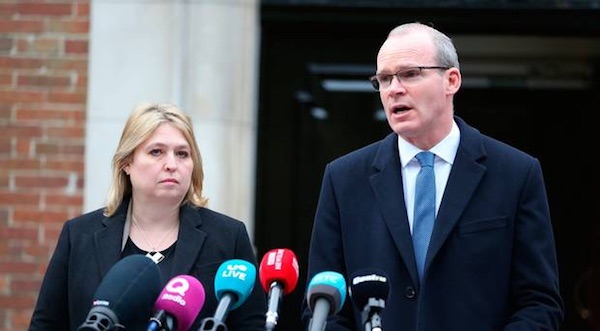
A new phase of talks to restore the powersharing Stormont Assembly is to begin next Wednesday amid a difficult political climate.
It is now over one year since the Stormont Assembly collapsed over corruption, inequality and political deadlock.
The new British Direct Ruler Karen Bradley said the need for a solution was “urgent” and the political consequences of failing to reach a deal would present a “significant setback to the progress” made since the 1998 Good Friday Agreement.
Bradley met with 26 County foreign affairs minister Simon Coveney on Thursday, their second meeting since she arrived in the North.
Mrs Bradley said there were still “significant difficulties to overcome”, but she believed a resolution is possible.
Failure to make “rapid progress” will mean the British government will face significant decisions, including setting a budget for the new financial year, she said.
The new British governor, who replaced James Brokenshire earlier this month, warned Stormont’s politicians that they face a loss of pay and “ultimately other arrangements”, including a possible election, if they do not return to their posts.
“A short, intense set of political talks to restore the executive” will begin on Wednesday, she said. “Based on my conversations so far, I believe it is possible to reach agreement.”
Mrs Bradley said she will be updating Parliament on the progress of the talks “no later than February 7”.
Mr Coveney said all parties were very conscious of the “time pressures”. He added: “I think we are talking about weeks rather than months here.”
Sinn Fein has confirmed it will enter the talks “on a short and intensive basis”. The party’s leader in the North, Michelle O’Neill, said the anticipated timeframe for the negotiations was two weeks.
“We are determined to find a resolution that sees the institutions restored and delivering rights for all citizens,” she said.
“Credible, sustainable institutions can only be based on equality, respect and genuine partnership government. These talks will be a test of whether the British government and the DUP are finally willing to endorse these basic principles.”
She added: “I told Karen Bradley that the British government is not a neutral and impartial player and there must be a change of approach on her part.”
“For too long, the British government has acquiesced in the denial of rights that are available everywhere else on these islands,” she said, pointing out that the institutions could only be restored on the basis of “equality, respect and genuine partnership government”.
“These talks will be a test of whether the British government and the DUP are finally willing to endorse these basic principles,” she said. “Both governments have a responsibility for rights and equality under the terms of the Good Friday Agreement.”
![[Irish Republican News]](https://republican-news.org/graphics/title_gifs/rn.gif)
![[Irish Republican News]](https://republican-news.org/graphics/title_gifs/harp.gif)

